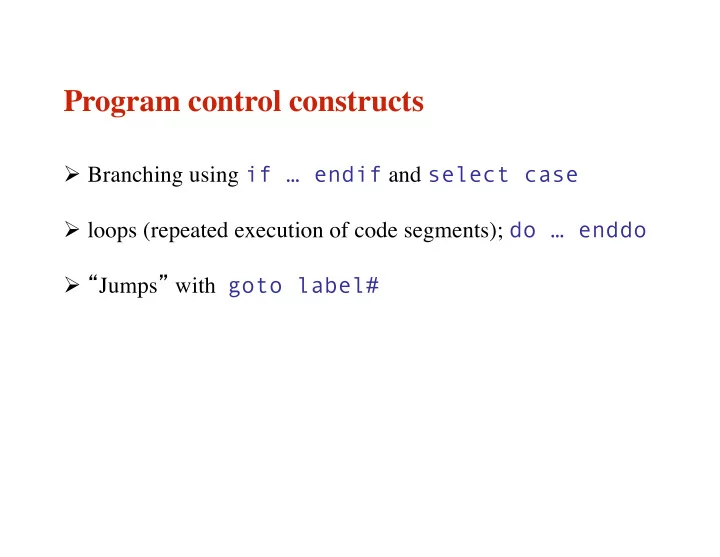

Program control constructs Ø Branching using if … endif and select case Ø loops (repeated execution of code segments); do … enddo Ø “ Jumps ” with goto label#
Branching with “ if … endif if … endif ” If (logical_a) then Relational operators statements_a elseif (logical_b) then == .eq. statements_b /= .ne. … > .gt. else < .lt. statements_else >= .ge. endif <= .le. § Expressions logical_i take the values .true. or .false . § Only statements after first true expression executed § The else branch optional Simpler form: if (logical_expression) statement
Example program; if.f90 integer :: int print*,'Give an integer between 1 and 99'; read*,int if (int<1.or.int>99) then print*,'Read the instructions more carefully! Good bye.' elseif (int==8.or.int==88) then print*,'A lucky number; Congratulations!' elseif (int==4.or.int==13) then print*,'Bad luck...not a good number; beware!' else print*,'Nothing special with this number, ' if (mod(int,2)==0) then print*,'but it is an even number' else print*,'but it is an odd number' endif endif
Loops Repeated execution of a code segment. Examples: “ Infinite ” loop Standard loop (also valid in f77) i=0 do do i=1,n i=i+1 print*,i**2 print*,i**2 enddo if (i==n) exit enddo Loop with do while “ Jump ” with go to 10 i=i+1 i=0 i2=i**2 do while (i<n) if (i2<sqmax) then i=i+1 print*,i,i2 print*,i**2 goto 10 enddo endif
Procedures; subroutines and functions Ø Program units that carry out specific tasks Ø Fortran 90 has internal and external procedures Internal subroutine program someprogram ... call asub(a1,a2,...) ... contains subroutine asub(d1,d2,...) ... end subroutine asub end program someprogram § asub can access all variables of the main program § d1,d2 are “ dummy ” arguments
character(80) :: word Program writerev1.f90 print*,'Give a word'; read*,word Ø Subroutine call without call reverse print*,word an argument list contains Ø The string word can be subroutine reverse accessed directly since reverse is an internal implicit none subroutine integer :: i,n character(80) :: rword rword='' n=len_trim(word) len_trim(string) do i=1,n rword(i:i)=word(n-i+1:n-i+1) gives length of string end do without trailing blanks word=rword end subroutine reverse end
character(80) :: word1,word2 print*,'Give two words'; read*,word1,word2 call reverse(word1) call reverse(word2) print*,trim(word2),' ',trim(word1) Program writerev2.f90 contains Ø Subroutine calls with argument lists subroutine reverse(word) implicit none Ø Strings word1,word2 integer :: i,n are passed through the character(80) :: word,rword dummy variable word rword='' n=len_trim(word) do i=1,n trim(string) rword(i:i)=word(n-i+1:n-i+1) string obtained when enddo word=rword trailing blanks removed from string end subroutine reverse end
character(80) :: word1,word2 print*,'Give two words'; read*,word1,word2 call reverse(word1(1:len_trim(word1)),len_trim(word1)) call reverse(word2(1:len_trim(word2)),len_trim(word2)) print*,trim(word2),' ',trim(word1) end subroutine reverse(word,n) Program writerev3.f90 implicit none Ø External subroutine; integer :: i,n cannot access variables character(n) :: word,rword of main program rword='' do i=1,n Ø string word declared rword(i:i)=word(n-i+1:n-i+1) enddo with variable length word=rword n passed from main end subroutine reverse
Functions (external) function poly(n,a,x) implicit none integer :: i,n real(8) :: poly,a(0:n),x poly=0.0d0 do i=0,n poly=poly+a(i)*x**i main program: enddo ... integer :: n end function poly real(8) :: a(0:nmax),x real(8), external :: poly real(8), external :: poly ... print*,poly(n,a(0:n),x)
Accessing “ global data ” Common blocks (outdated f77, but some times useful) Global data accessible in any unit in which declarations and common/blockname/v1,v2,... appears integer :: a,b common/block_1/a,b Modules Global data accessible in any unit in which use module_name appears module module_name integer :: a,b end module module_name Modules can also contain procedures, which are accessible only to program units using the module
Intrinsic procedures Ø Many built-in functions (and some subroutines) Ø In F90, many can take array argumens (not in F77) Mathematical functions: exp(x),sqrt(x),cos(x),... Type conversion: int(x),real(x),float(x) Character and string functions: achar(i) - ASCII character i iachar(c) - # in ASCII sequence of character c len(string),len_trim(string),trim(string) Matrix and vector functions: sum(a), matmul(m1,m2),dot_product(v1,v2)
Recommend
More recommend